Javad Zarif: Main threat to the Middle East is Israel, not Iran

Iran’s former foreign minister argues Israel, backed by the US, has killed every opportunity for peace. Months after being attacked by the United States and Israel, Iran finds itself in the crosshairs again, with Israeli officials lobbying US President Donald Trump to address Tehran’s ballistic missiles. Veteran Iranian diplomat Javad Zarif tells host Steve Clemons that “everybody lost any faith in diplomacy” after Israel and the US attacked Iran following five rounds of reconciliation talks between Washington and Tehran. Zarif added that Israel has historically thwarted every opportunity for reconciliation between Iran and the US, and that Trump’s style of diplomacy is disastrous, as it creates “negotiations that end up in war”. Published On 28 Dec 202528 Dec 2025 Click here to share on social media share2 Share Adblock test (Why?)
Polls open in Myanmar as military holds first election since 2021 coup
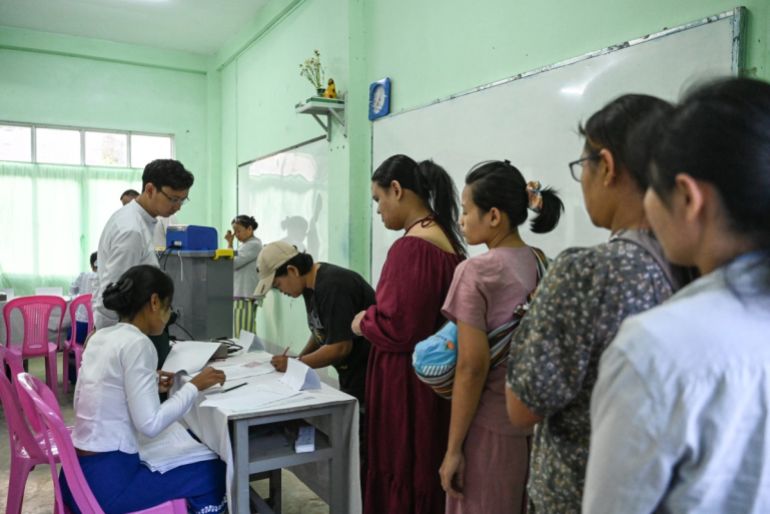
Polls have opened in Myanmar’s first general election since the country’s military toppled Nobel laureate Aung San Suu Kyi’s democratically elected government in a 2021 coup. The heavily restricted election on Sunday is taking place in about a third of the Southeast Asian nation’s 330 townships, with large areas inaccessible amid a raging civil war between the military and an array of opposition forces. Recommended Stories list of 3 itemsend of list Following the initial phase, two rounds of voting will be held on January 11 and January 25, while voting has been cancelled in 65 townships altogether. “This means that at least 20 percent of the country is disenfranchised at this stage,” said Al Jazeera’s Tony Cheng, reporting from Myanmar’s largest city, Yangon. “The big question is going to be here in the cities, what is the turnout going to be like?” In Yangon, polling stations opened at 6am on Sunday (23:30 GMT, Saturday), and once the sun was up, “we’ve seen a relatively regular flow of voters come in,” said Cheng. “But the voters are generally middle aged, and we haven’t seen many young people. When you look at the ballot, there are only few choices. The vast majority of those choices are military parties,” he said. The election has been derided by critics – including the United Nations, some Western countries and human rights groups – as an exercise that is not free, fair or credible, with anti-military political parties not competing. Aung San Suu Kyi, who was deposed by the military months after her National League for Democracy (NLD) won the last general election by a landslide in 2020, remains in detention, and her party has been dissolved. Advertisement The pro-military Union Solidarity and Development Party (USDP) is widely expected to emerge as the largest party. The military, which has governed Myanmar since 2021, said the vote is a chance for a new start, politically and economically, for the nation of 55 million people, with Senior General Min Aung Hlaing consistently framing the polls as a path to reconciliation. Dressed in civilian clothes, the military chief cast his ballot shortly after polling stations opened in Naypyidaw, the country’s capital. He then held up an ink-soaked figure and smiled widely. Voters must dip a finger into indelible ink after casting a ballot to ensure they do not vote more than once. He told reporters afterwards that the elections are free and fair, and the vote was not tarnished because it is being held by the military. The state-run Global New Light of Myanmar, in an opinion piece on Sunday, said the poll would open a new chapter and “serve as bridge for the people of Myanmar to reach a prosperous future”. Earlier, it reported that election observers from Russia, China, Belarus, Kazakhstan, Cambodia, Vietnam, Nicaragua and India have flown into the country ahead of the polls. ‘A resounding USDP victory’ But with fighting still raging in many areas of the country, the UN’s Special Rapporteur on Myanmar, Tom Andrews called on the international community to reject the military-run poll. “An election organised by a junta that continues to bomb civilians, jail political leaders and criminalise all forms of dissent is not an election – it is a theatre of the absurd performed at gunpoint,” Andrews said in a statement. “This is not a pathway out of Myanmar’s crisis. It is a ploy that will perpetuate repression, division and conflict,” he said. The civil war, which was triggered by the 2021 coup, has killed an estimated 90,000 people, displaced 3.5 million and left some 22 million people in need of humanitarian assistance. According to the Assistance Association for Political Prisoners, more than 22,000 people are currently detained for political offences. In downtown Yangon, stations were cordoned off overnight, with security staff posted outside, while armed officers guarded traffic intersections. Election officials set up equipment and installed electronic voting machines, which are being used for the first time in Myanmar. The machines will not allow write-in candidates or spoiled ballots. Among a trickle of early voters in the city was 45-year-old Swe Maw, who dismissed international criticism. Advertisement “It’s not an important matter,” he told the AFP news agency. “There are always people who like and dislike.” In the central Mandalay region, 40-year-old Moe Moe Myint said it was “impossible for this election to be free and fair”. “How can we support a junta-run election when this military has destroyed our lives?” she told AFP. “We are homeless, hiding in jungles, and living between life and death,” she added. The second round of polling will take place in two weeks’ time, before the third and final round on January 25. Dates for counting votes and announcing election results have not been declared. Analysts say the military’s attempt to establish a stable administration in the midst of an expansive conflict is fraught with risk, and that significant international recognition is unlikely for any military-controlled government. “The outcome is hardly in doubt: a resounding USDP victory and a continuation of army rule with a thin civilian veneer,” wrote Richard Horsey, an analyst at the International Crisis Group in a briefing earlier this month. “But it will in no way ease Myanmar’s political crisis or weaken the resolve of a determined armed resistance. Instead, it will likely harden political divisions and prolong Myanmar’s state failure. The new administration, which will take power in April 2026, will have few better options, little credibility and likely no feasible strategy for moving the country in a positive direction,” he added. The Southeast Asian nation of about 50 million is riven by civil war, and there will be no voting in rebel-held areas, which is more than half the country [Nhac Nguyen/AFP] Adblock test (Why?)
Russia-Ukraine war: List of key events, day 1,403

These are the key developments from day 1,403 of Russia’s war on Ukraine. By News Agencies Published On 28 Dec 202528 Dec 2025 Click here to share on social media share2 Share Here is where things stand on Sunday, December 28: Fighting At least two people were killed in Ukraine’s capital, Kyiv, and the surrounding region, after Russian forces launched a massive attack with hundreds of missiles and drones, ahead of Ukrainian President Volodymyr Zelenskyy’s meeting with United States President Donald Trump to work out a plan to end nearly four years of war. The attack also wounded at least 46 people, including two children, according to Ukrainian officials. Zelenskyy, who was on his way to meet Trump in Florida, said that Russia had launched nearly 500 drones and 40 missiles, targeting energy and civilian infrastructure. Ukraine’s state grid operator, Ukrenergo, said that energy facilities across Ukraine were struck, and emergency power cuts had been implemented across the capital. DTEK, Ukraine’s largest private energy company, said the attack had left more than a million households in and around Kyiv without power. Ukrainian Deputy Prime Minister Oleksii Kuleba said that more than 40 percent of residential buildings in Kyiv were left without heat, as temperatures hovered around 0 degrees Celsius (32 degrees Fahrenheit) following the attack. Poland’s Air Navigation Services Agency said in a statement on X that the Rzeszow and Lublin airports in the country’s southeastern region were temporarily shut following Russia’s strikes on Ukraine. The Operational Command of the Polish Armed Forces said that Polish and allied jets were deployed during the attack, but no violations of Polish airspace were reported. In Russia, air defence forces shot down 11 drones headed for the capital, Moscow, according to the city’s mayor, Sergei Sobyanin. Russia’s aviation watchdog, Rosaviatsia, said that Moscow’s Vnukovo and Sheremetyevo airports imposed temporary restrictions on airspace due to security reasons. Russia’s Ministry of Defence also said that its air defence systems had intercepted and destroyed more than 100 Ukrainian drones in three hours over six other Russian regions. Russian commanders told President Vladimir Putin that Moscow’s forces had captured the Ukrainian towns of Myrnohrad, Rodynske and Artemivka in Ukraine’s Donetsk region, as well as Huliaipole and Stepnohirsk in the Zaporizhia region, the Kremlin and Russian news agencies said on Telegram. But Ukraine’s military said in its daily battlefield update that its forces had beaten back Russian attempts to advance in the vicinity of Myrnohrad and Huliaipole. Politics and diplomacy Advertisement Zelenskyy announced in a Telegram message that he would hold talks with European leaders after his meeting with Trump on Sunday, as Kyiv pushes for a stronger position in the ongoing ceasefire negotiations to prevent Russia from prolonging the war in Ukraine. Zelenskyy said he wants to discuss with Trump territorial issues, the main stumbling block in talks to end the war, as a 20-point peace framework and a security guarantee deal near completion. On the way to the meeting in Florida, Zelenskyy stopped in Canada’s Halifax to meet Mark Carney, the Canadian prime minister said in a statement after the meeting. Carney denounced the latest Russian attack as “barbarism”, stressing that it is important for allies to “stand with Ukraine in this difficult time”. He also announced $1.83bn in additional economic aid to Ukraine. Zelenskyy spoke to European leaders following the meeting with Carney. In a statement posted on X, European Commission President Ursula von der Leyen said: “We welcome all efforts leading to our shared objective – a just and lasting peace that preserves Ukraine’s sovereignty and territorial integrity. And that strengthens the country’s security and defence capabilities.” Antonio Costa, the president of the European Council, which represents the bloc’s 27 member states, echoed von der Leyen’s promise to continue backing Ukraine, saying on X: “The EU’s support for Ukraine will not falter. In war, in peace, in reconstruction.” German Chancellor Friedrich Merz said that Zelenskyy had “the full support” of European leaders ahead of his talks with Trump. The leaders of NATO and the European Union said they would work “in close coordination” with the US “for a just and lasting peace in Ukraine”, Merz added in a statement. French President Emmanuel Macron said in a call with Zelenskyy that the latest Russian strikes on Kyiv showed that Moscow was not interested in ending the war, the AFP news agency reported, citing officials from Macron’s office. During the call, Macron highlighted what he called the “contrast” between “the willingness of Ukraine to build a lasting peace and Russia’s determination to prolong the war that it started”, the report said. Russian President Vladimir Putin said that Russia could see Kyiv was in no hurry to end the war by peaceful means, according to the Interfax news agency. Putin said that if Ukraine did not want to resolve the conflict peacefully, then Russia would accomplish all goals of its “special military operation” by force, Russian state news agency TASS reported. Ukrainian President Volodymyr Zelenskyy (right) and Canadian Prime Minister Mark Carney (left) speak to the media as they meet in Halifax, Nova Scotia, Canada, ahead of the former’s meeting with US President Donald Trump on Sunday [Ukrainian Presidential Office/Handout Photo via AFP] Adblock test (Why?)
UK curbs DRC visas, announces migrant return deals with Angola, Namibia

The United Kingdom has imposed visa restrictions on the Democratic Republic of the Congo, accusing its government of failing to cooperate with its new policy on the return of undocumented migrants and those who commit criminal offences. The UK Home Office announced the measures in a statement late on Saturday. It also said that Angola and Namibia have agreed to step up efforts to take back their citizens. Recommended Stories list of 3 itemsend of list The agreements mark the first major change under sweeping reforms unveiled by Secretary of State for the Home Department Shabana Mahmood last month to make refugee status temporary and speed up the deportation of those who arrive without documents in the UK. There was no immediate comment from the DRC, Angola or Namibia. The Home Office said the DRC failed to meet the UK’s requirements for cooperation and has now been stripped of fast-track visa services and preferential treatment for VIPs and decision makers. Mahmood said the UK could escalate measures to a complete halt of visas for the DRC unless cooperation rapidly improves. “We expect countries to play by the rules. If one of their citizens has no right to be here, they must take them back,” she said. “I thank Angola and Namibia and welcome their co-operation. Now is the time for the Democratic Republic of Congo to do the right thing. Take your citizens back or lose the privilege of entering our country. “This is just the start of the measures I am taking to secure our border and ramp up the removal of those with no right to be here,” she added. Prime Minister Keir Streamer’s centre-left government unveiled sweeping changes to the UK’s asylum system last month, including drastically cutting protections for refugees and their children, as part of a bid to stem the arrivals of irregular migrants that have fuelled rising anger on the far-right. Advertisement More than 39,000 people, many fleeing conflict, have arrived in the UK on small boats this year, more than for the whole of 2024 but lower than the record set in 2022, when the Conservatives were in power. Mahmood told lawmakers that the reforms, modelled on Denmark’s strict asylum system, would discourage refugees and asylum seekers from crossing the English Channel from France on small boats. She described the current system as “out of control and unfair”, adding that it was an “uncomfortable truth” that the government must face. Under the reforms, refugee status will become temporary and will be reviewed every 30 months. Refugees will be forced to return to their home countries once those are deemed safe. They will also need to wait for 20 years, instead of the current five, before they can apply for permanent residency. The government has also said it will legislate to make it harder for irregular migrants and foreign criminals to use the European Convention on Human Rights (ECHR) to stop deportation. Since July last year, the UK has “removed more than 50,000 people with no right to remain”, a 23 percent increase on the previous period, and instructed diplomats to make returns a top priority, Secretary of State for Foreign and Commonwealth Affairs Yvette Cooper said. The policy has been facing criticism, however, with Mark Davies, a former adviser to the Foreign Office, calling it “shameful” and a departure from “Britain’s historic commitment to support refugees”. Former Labour leader Jeremy Corbyn also described the policy as “draconian”, adding that it tries to “appease the most ghastly, racist right-wing forces all across Europe”, while undermining the UN Convention on Human Rights. Enver Solomon, chief executive of the Refugee Council, urged the government to reconsider, warning the plans “will not deter” crossings, and that refugees who work hard should be able to build “secure, settled lives”. Official figures cited by the AFP news agency showed that asylum claims in the UK are at a record high, with about 111,000 applications made in the year to June 2025. But the number of initial positive decisions the UK authorities granted fell from 2023 to 2024. Most asylum seekers and refugees arrive in the UK legally. Net migration reached a record high of 906,000 in the year to June 2023, before it fell to 431,000 in 2024, partly reflecting the tighter rules. Adblock test (Why?)
Russia using Belarus territory to bypass Ukraine’s defences, says Zelenskyy
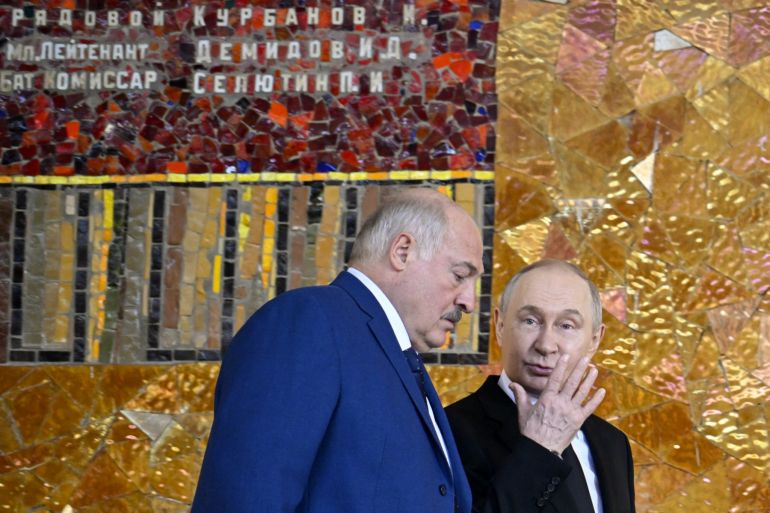
Ukrainian President Volodymyr Zelenskyy has accused Russia of using ordinary apartment blocks on the territory of its ally Belarus to attack Ukrainian targets and circumvent Kyiv’s defences. Zelenskyy made the allegations on Friday amid revelations by intelligence experts that Moscow has likely stationed its new nuclear-capable hypersonic ballistic missiles at a former airbase in eastern Belarus – a move seen as bolstering Russia’s ability to strike targets in Europe. Recommended Stories list of 3 itemsend of list “We note that the Russians are trying to bypass our defensive interceptor positions through the territory of neighbouring Belarus. This is risky for Belarus,” Zelenskyy wrote on the Telegram messaging app on Friday after a military staff meeting. “It is unfortunate that Belarus is surrendering its sovereignty in favour of Russia’s aggressive ambitions,” the Ukrainian leader said. Zelenskyy said Ukrainian intelligence had observed that Belarus was deploying equipment “in Belarusian settlements near the border, including on residential buildings” to assist Russian forces in carrying out their attacks. “Antennae and other equipment are located on the roofs of ordinary five-storey apartment buildings, which help guide ‘Shaheds’ [Russian drones] to targets in our western regions,” he said. “This is an absolute disregard for human lives, and it is important that Minsk stops playing with this,” he added.> The Russian and Belarusian defence ministries did not immediately respond to requests for comment. Russia had previously used Belarusian territory to launch its February 2022 invasion of Ukraine, and Belarus remains a steadfast ally, though President Alexander Lukashenko has pledged to commit no troops to the conflict. Russian President Vladimir Putin and Belarusian President Alexander Lukashenko attend a wreath-laying ceremony at the Eternal Flame in the Hall of Military Glory at the Mamayev Kurgan World War II memorial complex in Russia’s southern city of Volgograd in April 2025 [File: Alexander Nemenov/AFP] Belarus defence minister: ‘Our response’ to the West’s ‘aggressive actions’ Amid reports of closer Russian and Belarusian coordination in the war on Ukraine, satellite imagery analysed by two US researchers appears to show that Moscow is stationing Oreshnik hypersonic ballistic missiles in eastern Belarus, according to an exclusive Reuters news agency report. Advertisement Oreshnik had been described by Russian President Vladimir Putin as impossible to intercept, and he previously made clear his intention to deploy the missiles – which have an estimated range of up to 5,500km (3,400 miles) – in Belarus. Researchers Jeffrey Lewis of the Middlebury Institute of International Studies, in California, and Decker Eveleth of the CNA research and analysis organisation in Virginia, said they were 90 percent certain that mobile Oreshnik launchers would be stationed at the former Russian airbase near Krichev, some 307km (190 miles) east of the Belarus capital of Minsk. The United States researchers said reviews of satellite imagery revealed a hurried construction project in Belarus that began between August 4 and 12, and contained features consistent with those of a Russian strategic missile base. One “dead giveaway” in a November 19 satellite image was a “military-grade rail transfer point” enclosed by a security fence to which missiles, their mobile launchers and other components could be delivered by train to the site, Eveleth told Reuters. Another feature, said Lewis, was the construction of a concrete pad that was then covered with earth, and which he called “consistent” with a camouflaged missile launch point. The researchers’ assessment broadly aligns with US intelligence findings, according to the report. Russia and Belarus have yet to comment on the Reuters report. But, earlier this month, President Lukashenko acknowledged the deployment of such weapons in his country, although he did not say to which part of the country the Russian missiles have been deployed. He added that up to 10 Oreshniks would be deployed within the country. State-run BelTA news agency quoted Belarusian Defence Minister Viktor Khrenin as saying this week that the Oreshnik’s deployment would not alter the balance of power in Europe and was “our response” to the West’s “aggressive actions”. The White House did not immediately respond to a request for comment on the reported Russian missile deployment to Belarus. Ukraine’s capital came under a new “massive” Russian attack early on Saturday, with explosions reported in the city, air defences in operation and the Ukrainian military saying cruise and ballistic missiles were being deployed. On Sunday, President Zelenskyy is scheduled to meet with US President Donald Trump to finalise a possible ceasefire deal between Moscow and Kyiv. In advance of the meeting, Zelenskyy told the Axios news site that he was open to putting the Washington-led “20-point” peace plan to a referendum – as long as Russia agreed to a 60-day ceasefire to allow Ukraine to prepare for and hold such a vote. Adblock test (Why?)
Over 1,500 flights cancelled as winter storm Devin hits US holiday travel

More than 40 million Americans under winter storm warnings or weather advisories as heavy snow expected. Published On 27 Dec 202527 Dec 2025 Click here to share on social media share2 Share Thousands of flights have been cancelled and delayed in the United States due to winter storm Devin, airline monitoring website FlightAware reports, dealing a blow to air travel during peak holiday time. A total of 1,581 flights “within, into or out of the” US were cancelled and 6,883 delayed as of 4pm US Eastern Time (21:00 GMT) on Friday, according to FlightAware, which describes itself as the world’s largest flight tracking data company. Recommended Stories list of 4 itemsend of list The delays and cancellations came as the US National Weather Service warned of winter storm Devin causing “hazardous travel conditions” and heavy snow forecast across parts of the Midwest and northeast. More than 40 million Americans were under winter storm warnings or weather advisories on Friday, plus another 30 million under flood or storm advisories in California, where a so-called atmospheric river has brought a deluge of rain. New York City, the largest US city, was bracing for up to 250mm (10 inches) of snow overnight on Friday, the most expected in four years. Temperatures were forecast to drop into the weekend when an Arctic blast is expected to swoop down from Canada. New York’s John F Kennedy airport, Newark Liberty international airport and LaGuardia airport warned travellers of potential delays or cancellations. More than half of the flight cancellations and delays took place at these three airports, according to FlightAware. JetBlue Airways cancelled 225 flights on Friday, the most among the US carriers, closely followed by Delta Air Lines, which cancelled 212 flights. Republic Airways cancelled 157 flights, while 146 were cancelled by American Airlines and 97 by United Airlines. Advertisement “Due to winter storm Devin, JetBlue has cancelled approximately 350 flights today and tomorrow, primarily in the Northeast where JetBlue has a large operation,” a JetBlue spokesperson told the Reuters news agency. On the US West Coast, powerful winter storms brought the wettest Christmas season to Southern California in 54 years. There was still a risk of more flash flooding and mudslides on Friday despite slackening rain around Los Angeles, the National Weather Service warned. Firefighters rescued more than 100 people on Thursday in Los Angeles County, with one helicopter pulling 21 people from stranded cars, officials said. Adblock test (Why?)
Thailand and Cambodia agree on ceasefire, Cambodia Defence Ministry says

BREAKINGBREAKING, Agreement follows talks aimed at ending weeks of deadly clashes along the Thailand-Cambodia border. Published On 27 Dec 202527 Dec 2025 Click here to share on social media share2 Share Thailand and Cambodia said they have signed a ceasefire agreement to end weeks of fierce fighting along their border which has killed more than 100 and forced the displacement of more than half a million civilians in both countries. “Both sides agree to an immediate ceasefire after the time of signature of this Joint Statement,” the Thai and Cambodian defence ministers said in a statement on Saturday. Recommended Stories list of 4 itemsend of list “Both sides agree to maintain current troop deployments without further movement,” the ministers said. The ceasefire is scheduled to take effect at noon local time (05:00 GMT) and extends to “all types of weapons” and “attacks on civilians, civilian objects and infrastructures, and military objectives of either side, in all cases and all areas”. The agreement, signed by Thai Defence Minister Natthaphon Narkphanit and his Cambodian counterpart Tea Seiha, ends 20 days of fighting, the worst between the two Southeast Asian neighbours in years. This is a breaking news story. More to follow soon. Adblock test (Why?)
Israeli settler runs over Palestinian man praying near Ramallah
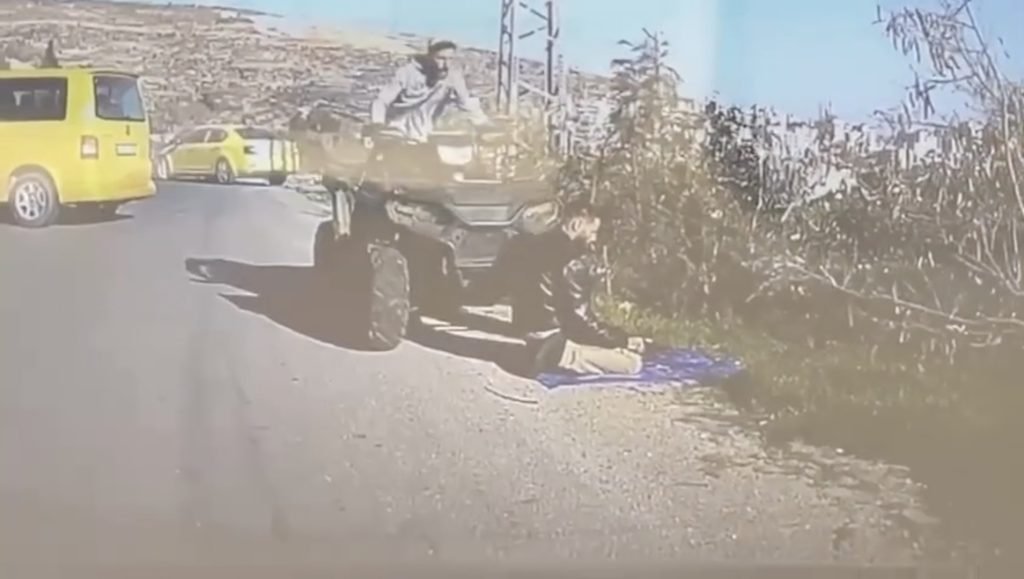
NewsFeed An Israeli settler ran over a Palestinian man while he was praying by the roadside near Deir Jarir, northeast of Ramallah. In a separate incident the same day, armed settlers attacked homes in the village, injuring another man and firing live ammunition, as Israeli forces entered the area. Published On 26 Dec 202526 Dec 2025 Click here to share on social media share2 Share Adblock test (Why?)
Court finds Malaysia’s former PM Najib Razak guilty of abuse of power
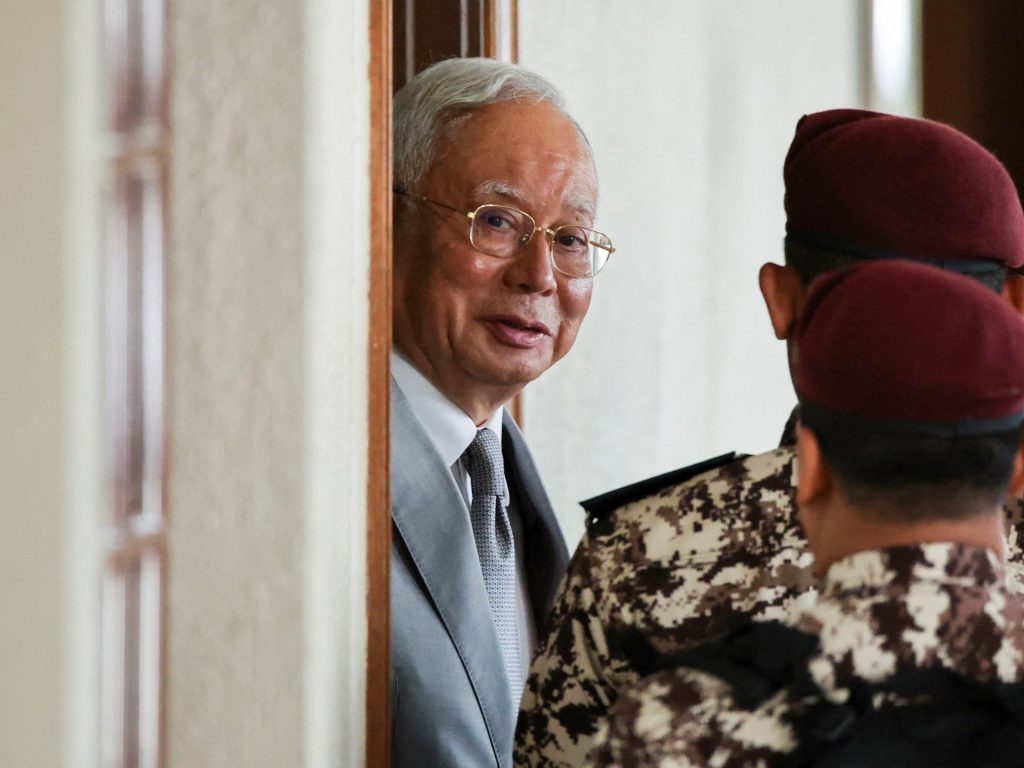
BREAKINGBREAKING, Malaysian high court finds former PM Najib guilty in trial related to the 1MDB sovereign wealth fund scandal. Published On 26 Dec 202526 Dec 2025 Click here to share on social media share2 Share Former Malaysian Prime Minister Najib Razak has been found guilty in his second major trial involving the multibillion-dollar 1MDB scandal. The ruling was handed down by the Kuala Lumpur High Court on Friday, where Najib, 72, faced four counts of abuse of power and 21 counts of money laundering over the illegal transfer of about 2.2 billion Malaysian ringgit ($539m) from 1MDB. Recommended Stories list of 4 itemsend of list Prosecutors say Najib abused his position as prime minister, finance minister and 1MDB advisory board chairman to move large amounts of money from the Malaysian sovereign wealth fund to his personal accounts more than a decade ago. Najib was previously found guilty and sentenced in 2020 to 12 years’ imprisonment for misappropriating about $9.9m in 1MDB funds. His sentence was later commuted to six years. This trial, Najib’s second, was widely considered the most significant to date because it directly involved 1MDB entities and much larger sums of money. The marathon legal proceedings have spanned seven years and saw lawyers call 76 witnesses to the stand, including Najib himself. “The trial has had a lot of delays, and it’s a very complicated thing to understand,” said Bridget Welsh, an honorary research associate with the University of Nottingham Asia Research Institute Malaysia. “These financial crimes are multi-layered, and it’s been a long, extensive process,” Welsh told Al Jazeera. Najib apologised last year for mishandling the 1MDB scandal, but during his recent trial maintained that he had been led astray by the fugitive Malaysian financier Jho Low, who has been wanted by Interpol since 2016 and whose current whereabouts are unknown. Advertisement During legal proceedings on Friday, Judge Collin Lawrence Sequerah told the court that evidence indicated Najib had an “unmistakable bond and connection” with Low, who served as the prime minister’s “proxy and intermediary”, Reuters reported. The judge also challenged Najib’s defence that he believed some of his ill-gotten funds were “donations” from the Saudi royal family, Reuters said. This is a breaking news story. More to follow soon. Adblock test (Why?)
LIVE: Nigeria confirms US strikes on ISIL targets in its northwest
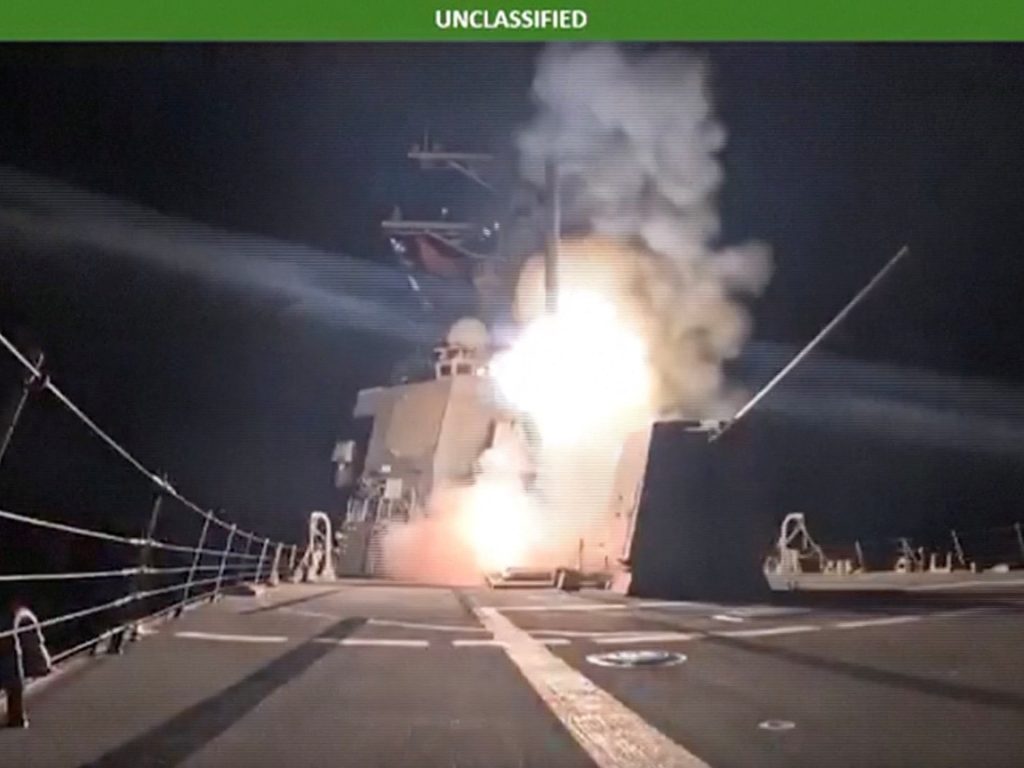
blinking-dotLive updatesLive updates, Nigeria says US claims that Christians face persecution do not represent a complex security situation and ignore efforts by Nigerian authorities to safeguard religious freedom. Published On 26 Dec 202526 Dec 2025 Click here to share on social media share2 Share Adblock test (Why?)

